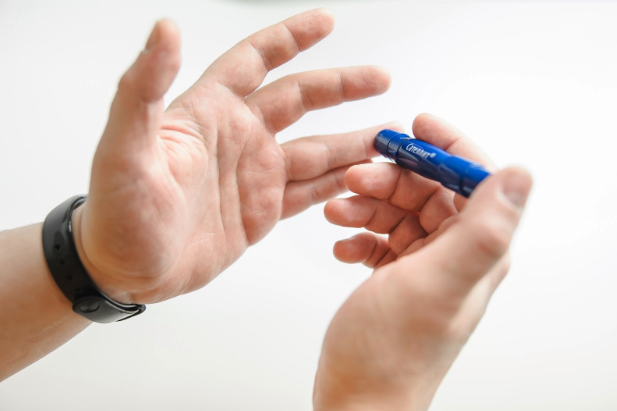According to the CDC, over 9% of Americans are living with diabetes. This illness is becoming increasingly common, with 1.5 million Americans being diagnosed with diabetes every year.
 There are some serious complications that can come with having high blood sugar such as heart failure and stroke. However, diabetes can be managed with prescription medication, diet, and exercise to help you live a normal, healthy life.
There are some serious complications that can come with having high blood sugar such as heart failure and stroke. However, diabetes can be managed with prescription medication, diet, and exercise to help you live a normal, healthy life.
What is diabetes?
Diabetes is an illness that occurs when blood sugar (blood glucose) is too high, and this can be due to insulin resistance (type 2 diabetes) or the inability to create insulin (type 1 diabetes).
Type 1 diabetes is usually diagnosed during childhood. In contrast, type 2 diabetes can develop at any age but is more common in older populations.
Prediabetes occurs when your blood sugar is identified as higher than normal but is not high enough to be type 2 diabetes. There are changes that can be made to lessen the likelihood of progressing the disease to type 2 diabetes.
Early signs and symptoms of diabetes
1. Frequent urination
When your blood sugar is high, your kidneys expel the excess blood sugar, causing you to urinate more frequently. One of the early warning signs of diabetes is frequent urination that is urgent enough to wake you up to go to the bathroom during sleep.
2. Increased thirst
While your kidneys are working overtime and you’re urinating more frequently, valuable fluids will be pulled from your tissues. Frequent urination will make you feel constantly thirsty.
3. Fatigue
When your blood sugar is high, your body works hard to get rid of the excess sugar. Not only does this process take a toll on your body, but it also alters the way that your body uses glucose for energy. Excessively high blood sugar, or hyperglycemia, has fatiguing effects among other symptoms. Additionally, the dehydration that accompanies more frequent urination is a common cause of fatigue in diabetics.
4. Blurred vision
High blood sugar can cause damage to the small blood vessels of the eye, resulting in a swollen lens that can cause blurred vision. As blood sugar levels rise and lower, your vision may return to normal or worsen, respectively.
5. Increased hunger
When you have high blood sugar, your body is actively looking to get rid of it. Because your body expels so much of the glucose you’re getting from your food, you may have increased feelings of hunger.
6. Unexplained weight loss
With the discharge of excess glucose, you’re losing your largest energy source, and when your body is unable to use glucose for energy, it starts burning fat and muscle, causing weight loss. Unexplained weight loss is considered to be significant at 10 lbs or 5% of overall body weight.
7. Slow healing cuts and wounds
Similarly to damaged eye tissue causing blurred vision, damaged blood vessels cause weakened blood circulation. Because of this, it’s harder for blood to reach the affected area, and minor cuts or wounds can take weeks or months to heal. This slow healing makes unhealed cuts and wounds prone to infection, increasing the risk of amputation.
8. Tingling or numbness in the hands or feet
High blood sugar can have a significant impact on nerves. This damage can start with feelings of tingling or numbness and can escalate to pain or neuropathy over time.
9. Skin discoloration
Insulin resistance can cause your skin to develop dark patches (acanthosis nigricans) that are typically found in the folds of the neck, underarm area, or groin. This darkened skin can appear raised and velvety in texture.
10. Yeast infections
The excess sugar in your blood and urine creates an ideal environment for yeast. Yeast can feed off the extra sugar in genital areas, as well as the mouth or armpits. Maintaining blood sugar can help reduce the likelihood of getting yeast infections.
Risk factors
If you find that you have risk factors for developing diabetes, it’s important to take extra care in preventing the onset of diabetes. Some common risk factors include:
- 45 years or older
- Overweight or obese
- Sedentary lifestyle
- Family history of diabetes
- History of gestational diabetes
- History of high blood pressure, heart disease, or stroke
- Are African American, Alaska Native, American Indian, Asian American, Hispanic/Latino, Native Hawaiian, or Pacific Islander
The American Diabetes Association has a risk test that can help you determine if you are at risk of developing type 2 diabetes.
Keep up with your appointments at Voyage Healthcare!
You may experience all or none of these symptoms of diabetes, so it’s important to keep up with screenings if you’re at risk. If you are experiencing any of these symptoms, be sure to schedule an appointment.